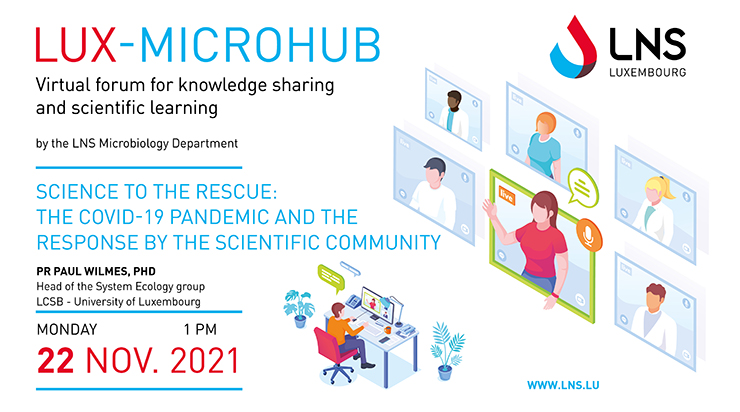

La pandémie COVID-19 a mis les réunions virtuelles au centre de la scène. Le département de microbiologie du LNS lance un nouveau forum en ligne, nommé Lux-MicroHub, avec l’objectif de partager avec vous notre savoir et nos connaissances scientifiques autour des dernières nouvelles en microbiologie clinique, et ce sur une base mensuelle.
C’est donc avec grand plaisir que nous vous invitons à participer au 5e webinar Lux-MicroHub, en anglais, qui aura lieu le lundi, 22 novembre à 13h00. Pour participer, vous n’avez qu’à vous connecter via le lien Webex suivant: https://lns.webex.com/lns/j.php?MTID=mad9f8a026bf1e2428ef07effeb49f2fc
The COVID-19 pandemic has created an unprecedented public health crisis with deep impacts on health, social life, and the economy. During my talk, I will explore how the scientific community in Luxembourg rose to the challenge resulting in programmes and data, which allowed the country and its leadership to address the manifold impacts of the crisis.
After the presentation, we will dedicate time for questions to our invited speakers. If you already have specific questions, feel free to address them to luxmicrohub@lns.etat.lu before the 22nd of November.
| Paul Wilmes is Professor of Systems Ecology and holds appointments at the Luxembourg Centre for Systems Biomedicine and in the Department of Life Sciences and Medicine within the Faculty of Science, Technology and Medicine of the University of Luxembourg. He heads the Systems Ecology Research Group. During the COVID-19 pandemic, Paul acted as co-speaker of the COVID-19 Task Force of Research Luxembourg and was appointed “chargé de mission” by the University of Luxembourg. |
 Pr PAUL WILMES, PhD |
As a British Chevening Scholar, Paul earned his PhD from the School of Environmental Sciences at the University of East Anglia (UK) in 2006. For part of his doctoral research, he spent time as a German Academic Exchange Service Visiting Scientist at the Max Planck Institute for Marine Microbiology in Bremen (Germany). Paul subsequently carried out postdoctoral research at the University of California, Berkeley (USA) from where he returned in 2010 to his native Luxembourg through the ATTRACT fellowship scheme of the Luxembourg National Research Fund. Paul was awarded an European Research Council (ERC) Consolidator Grant in 2019. He is an elected full member of the Institut Grand-Ducal, Section des Sciences naturelles, physiques et mathématiques, and the Académie Lorraine des Sciences. In 2018, Paul was awarded the Grand Prix in Biological Sciences of the Institut Grand-Ducal.
Paul’s main research focus is on using Systems Biology approaches for unraveling fundamental ecological relationships within and between microbial populations in situ. His group has pioneered the development of appropriate wet- and dry-lab methodologies for performing systematic molecular measurements of microbial consortia over space and time. This allows for example to define lifestyle strategies of distinct populations and link these to genetic and functional traits. The same approaches are allowing the study of microbiome-host molecular interactions. In this context, his group has developed a microfluidics-based in vitro model of the human-microbial gastrointestinal interface called HuMiX.
Paul has authored more than 100 peer-review publications and is a Highly Cited Researcher. He is a frequently invited speaker at international scientific symposia and academic institutions.